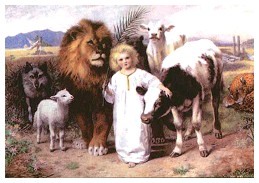"They [Christians] could have their own private torture chambers and satisfy their favorite spiritual desire's forever."
:yawn: Christians prefer that men repent (2 Pe 3:9, Ac 20:20).
"Mt 5:5. Blessed are the meek: for they shall inherit the earth—This promise to the meek is but a repetition of Ps 37:11; only the word which our Evangelist renders “the meek,” after the Septuagint, is the same which we have found so often translated “the poor,” showing how closely allied these two features of character are. It is impossible, indeed, that “the poor in spirit” and “the mourners” in Zion should not at the same time be “meek”; that is to say, persons of a lowly and gentle carriage. How fitting, at least, it is that they should be so, may be seen by the following touching appeal: “Put them in mind to be subject to principalities and powers, to obey magistrates, to be ready to every good work, to speak evil of no man, to be no brawlers, but gentle, showing all meekness unto all men: FOR WE OURSELVES WERE ONCE FOOLISH, disobedient, deceived, serving divers lusts and pleasures … But after that the kindness and love of God our Saviour toward man appeared …: according to His mercy He saved us,” &c. (Tit 3:1–7). But He who had no such affecting reasons for manifesting this beautiful carriage, said, nevertheless, of Himself, “Take My yoke upon you, and learn of Me; for I am meek and lowly in heart: and ye shall find rest unto your souls” (Mt 11:29); and the apostle besought one of the churches by “the meekness and gentleness of Christ” (2 Co 10:1). In what esteem this is held by Him who seeth not as man seeth, we may learn from 1 Pe 3:4, where the true adorning is said to be that of “a meek and quiet spirit, which in the sight of God is of great price.” Towards men this disposition is the opposite of high-mindedness, and a quarrelsome and revengeful spirit; it “rather takes wrong, and suffers itself to be defrauded” (1 Co 6:7); it “avenges not itself, but rather gives place unto wrath” (Ro 12:19); like the meek One, “when reviled, it reviles not again; when it suffers, it threatens not: but commits itself to Him that judgeth righteously” (1 Pe 2:19–22). “The earth” which the meek are to inherit might be rendered “the land”—bringing out the more immediate reference to Canaan as the promised land, the secure possession of which was to the Old Testament saints the evidence and manifestation of God’s favor resting on them, and the ideal of all true and abiding blessedness. Even in the Psalm from which these words are taken the promise to the meek is not held forth as an arbitrary reward, but as having a kind of natural fulfilment. When they delight themselves in the Lord, He gives them the desires of their heart: when they commit their way to Him, He brings it to pass; bringing forth their righteousness as the light, and their judgment as the noonday: the little that they have, even when despoiled of their rights, is better than the riches of many wicked (Ps 37:1–24). All things, in short, are theirs—in the possession of that favor which is life, and of those rights which belong to them as the children of God—whether the world, or life, or death, or things present, or things to come; all are theirs (1 Co 3:21, 22); and at length, overcoming, they “inherit all things” (Rev 21:7). Thus are the meek the only rightful occupants of a foot of ground or a crust of bread here, and heirs of all coming things." Jamieson, R., Fausset, A. R., & Brown, D. (1997). Commentary Critical and Explanatory on the Whole Bible (Vol. 2, pp. 17–18). Oak Harbor, WA: Logos Research Systems, Inc.

